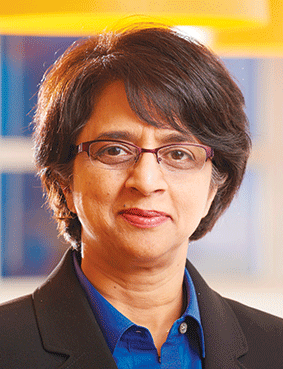 Dr. Siva Kumari is director-general of the International Baccalaureate Organisation (IBO), Geneva, which has 3,800 affiliated schools in 147 countries worldwide. An alumna of Cincinnati and Houston (USA) universities, Dr. Kumari was formerly provost of K-12 initiatives at Rice University, Houston before to being appointed regional director (Asia-Pacific) of the IBO in 2009. In January 2014, she became the first Indian-origin woman to be appointed director-general of IBO. Excerpts from a telephone-cum-email interview:
Dr. Siva Kumari is director-general of the International Baccalaureate Organisation (IBO), Geneva, which has 3,800 affiliated schools in 147 countries worldwide. An alumna of Cincinnati and Houston (USA) universities, Dr. Kumari was formerly provost of K-12 initiatives at Rice University, Houston before to being appointed regional director (Asia-Pacific) of the IBO in 2009. In January 2014, she became the first Indian-origin woman to be appointed director-general of IBO. Excerpts from a telephone-cum-email interview:
The number of IB schools in India has grown from a handful in the 1990s to over 120 currently. How satisfied are you with this pace of growth?
Quite satisfied. We aren’t looking for growth in terms of number of affiliated schools. Our objective is to create a community of mission-aligned schools which can add value to the country’s education system. We are satisfied that Indian students now have access to a set of standards and curriculums which are internationally benchmarked.
IBO’s school-leaving IB diploma has proved popular around the world. To what factors do you attribute this phenomenon?
The diploma is an academically rigorous programme which prepares students around the world for higher education with a time-tested standardised curriculum. The best universities in the world regard an IB diploma holder as having been thoroughly tested and prepared for university. The diploma programme contains subjects of study which are unique to IBO. Students are not only prescribed a wider range of subjects than other national and international examination boards, they are also trained in research skills and undertake projects which have real world impact, often within their own communities. Consequently, they are equipped with critical thinking and research skills of undergraduate students, giving them an early advantage.
What would you say are the distinguishing characteristics of IBO curriculums and pedagogy?
Our primary, middle years and IB diploma programmes are learner-centric and strike a balance between rigorous academics and life skills such as creativity and experiential learning which enable students to apply theoretical learning and knowledge. We incorporate best teaching and learning practices from around the world and our curriculums from PYP (primary years programme) onwards encourage students to think critically and apply knowledge to local and global problems. Our objective is to teach students to think, analyse and develop specific skills to manage their learning for life.
It’s widely believed that teacher training and development which IBO insists upon as condition of granting affiliation, is very expensive. What’s your comment?
We are aware of feedback from our schools about the relatively high cost of teacher training. But we insist on high investment in teacher development to prepare teachers in affiliated schools for IB-type teaching. We believe students and parents need teachers who can make a 180 degree difference, and we have a large network of teacher educators throughout the world who can train and prepare teachers of newly affiliated schools. Sharing of best practices across international boundaries is also an invaluable part of what we offer. That said, we are continually creating new teacher education models to reduce costs. Further, as the IB community in India grows in size, affiliated schools will be encouraged to share good practices.
How popular are IBO curriculums in China and South-east Asia. What are the numbers?
In these regions also IBO is gaining popularity. In addition to working directly with schools, we also work with governments to develop high-quality, globally benchmarked education solutions for students, with Japan being a recent example. The aggregate number of IBO-affiliated schools in this region is 153, of which 90 are in China, 54 in Hong Kong, 47 in Indonesia, 31 in Singapore, 20 in Malaysia and Thailand, 15 in the Philippines, 11 in Vietnam and fewer numbers in Myanmar, Cambodia, Taiwan etc.
What are your future plans for India?
We plan to build a strong community of IB schools as we have done in Australia. In India, this community will become self-sustaining and develop IB-inspired, locally appropriate pedagogies and best practices. To this end, we are continuously talking to schools interested in implementing IB programmes for the first time, and also to schools interested in adding programmes to their existing IB curricula. We are growing in new areas of the country and look forward to further conversations and interest from new schools. We also hope the HRD ministry will understand our programmes and curriculums better.